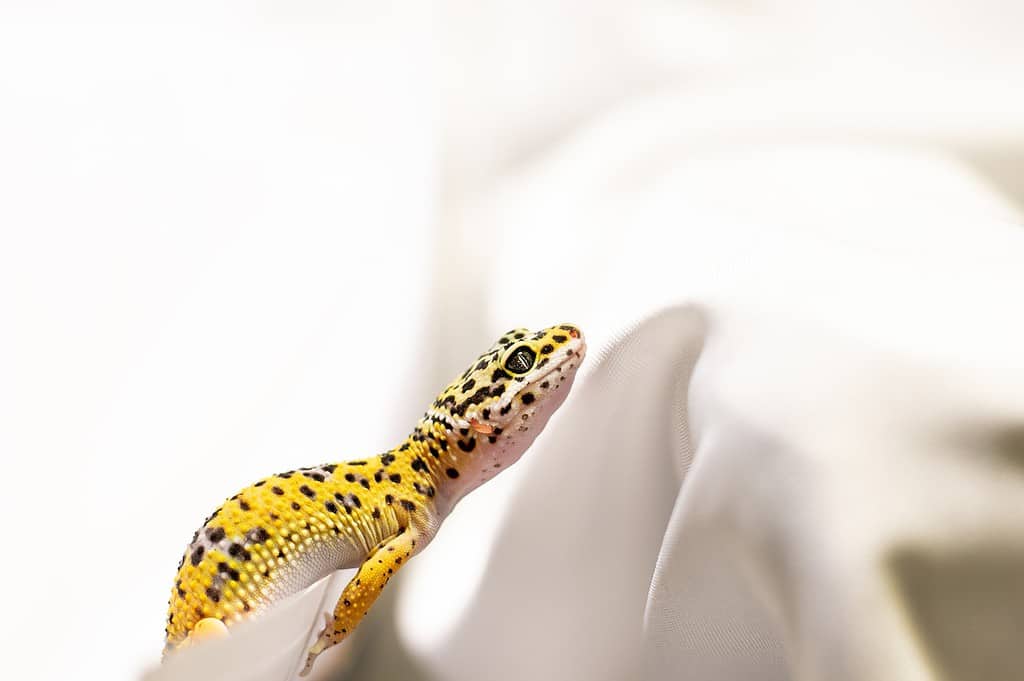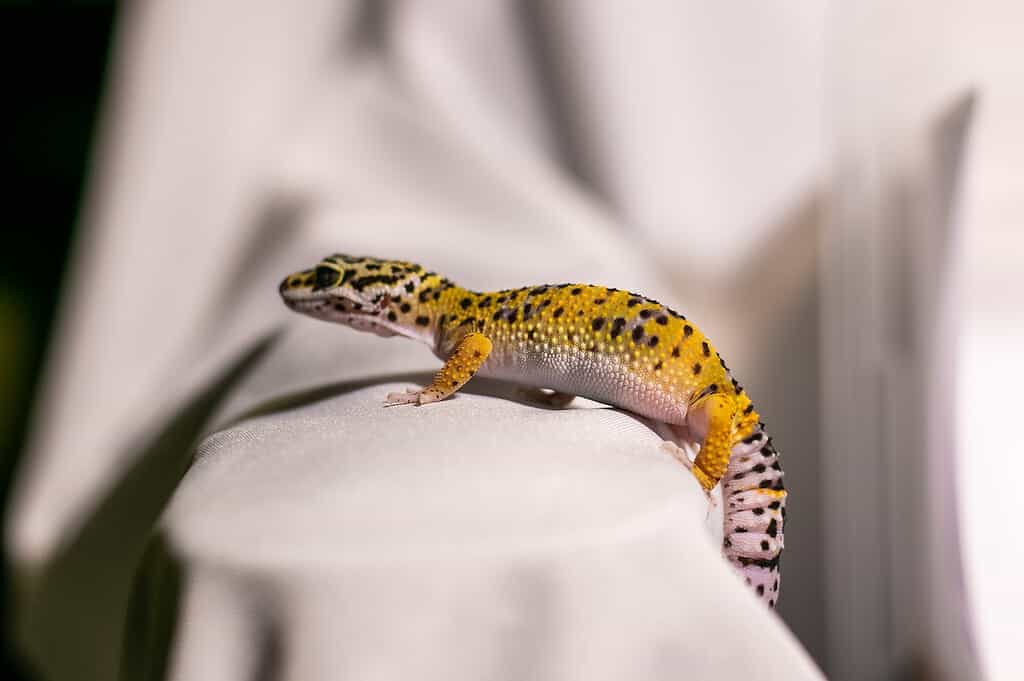If you spend time with your leopard gecko and notice that it gets excited when you come near, or if you are thinking about getting one after seeing a group of them smile at you in a pet store, you may be curious about Leo’s personality. You may think, Are Leos sociable? Can they show affection with their owner?

Leopard geckos are calm and friendly but can’t show much affection or form strong attachments with their owners. Leopard geckos are sociable but not affectionate because they have a physical bond with their owners instead of an emotional one.
We must begin by analyzing the personality of a typical leopard gecko. First, though, we need to discuss how being friendly differs from being affectionate. Affection is showing kindness to others because you have a strong emotional connection. In contrast, friendliness is when you respond to other people and stimuli in a way that is not hostile and is approachable. Now that we’ve clarified let’s see which describes your scaly companion.
Are Leopard Geckos Sociable Animals?
Yes, they are friendly animals. It is one of the main reasons why leopard geckos have become so common as household pets in recent years. They are friendly and easy to talk to, so they don’t act aggressively. In addition, they are great pets for children and can make an excellent introduction to the world of reptiles. A leopard gecko’s friendly attitude allows it to be handled without fear.
Even though leopard geckos may like being with you, they are not usually affectionate. They don’t like being petted to feel closer to their owners. In addition, unlike a dog or a cat, they will not seek your attention or try to satisfy you in any way.
Leopard Gecko Friendliness
Leopard geckos are expressive species, meaning their friendliness is somewhat visible when interacting with them. When sociable, leopard geckos are curious about their companion. They will keep an inquisitive eye on the individual and may even emerge from their hiding place or where they are basking to observe what the person is up to. They’ll climb all over you as curious creatures if they’re outside the cage.
Your leopard gecko may be perfectly content with its life, even if it doesn’t feel like climbing on you or being handled right now. A happy leopard gecko will have its ears open, seem comfortable, and be curious about its surroundings. A contented leopard gecko will frequently engage in activities such as sunbathing and exploring while stroking its tongue.
If it’s not sleeping, it will look interested in its environment. It will be in a state of interest while exploring or relaxing when it is basking in the light or cooling off in its shelter, just as it would be in those states while it is crawling on its owner or remaining warm in its hands. Your leopard gecko isn’t avoiding handling because it’s upset—it just wants to explore or relax in the warm light.
Your leopard gecko should not be swinging its tail about like this since this behavior suggests that it is either irritated, stressed, or feels like a threat to its territory.
How to Know If Your Leopard Gecko Is Happy
Reptiles can’t experience joy in the same way that we do. Having said all of that, the happiness of your leopard gecko is primarily dependent on its state of health. If your leopard gecko has an illness, he will be uncomfortable. On the other hand, a gecko in good health is a happy gecko.
Because of this, one way to determine whether your leopard gecko is pleased is to search for symptoms of disease or sickness. Here look at some of the more obvious indications that your leopard gecko is healthy and, as a result, happy.
He is Active.
The fact that your leopard gecko is active is the first indication that he is happy in his environment. Your leopard gecko is likely pleased if he explores his tank, wanders between the warm and cold spots, and approaches the glass when he’s hungry or sees you.
On the other hand, a depressed leopard gecko would have a sluggish and dull temperament. He may spend a lot of time resting or sitting with his eyes closed and won’t move around his tank.
He Reacts to Motion and Touch.
Happy leopard geckos react to movement and touch. If your gecko moves every time you walk by the tank, he is vigilant and happy. When he gets hungry, he tends to be highly reactive. They all indicate that your leopard gecko is in a good mood.
A dissatisfied leopard gecko will hold its position and give few indications that it is paying attention to its surroundings. Even though it looks like it doesn’t notice, the gecko does. He doesn’t seem interested in moving at all, which is a very alarming symptom that your gecko is uncomfortable.
His Movements Are Smooth.
However, a happy gecko will engage in more activity than merely moving about. Instead, the movement of a contented leopard gecko will be fairly smooth. Your leopard gecko’s smooth movements indicate it’s not worried.
If your leopard gecko displays a lot of jerky movements, it is likely because he is unhappy and terrified. This is especially the case when his tail is moving back and forth. If you see a gecko waving his tail at you, it is clear that he wants you to back off because he is scared or stressed.
He Eats a Lot.
A pleased gecko enjoys its food very much. Your gecko is happy and healthy if he looks forward to his food and tells you when he’s hungry. You should keep feeding him the same way you always do so that he may maintain his balanced diet and cheerful disposition.
If you see that your leopard gecko has lost his appetite and does not react when food is presented to him, he may be unhappy and ill. If you find your leopard gecko is not eating as much, you should take it to the veterinarian as soon as possible.

He Sleeps Well.
The final indication that a gecko is in good health is that it has a normal cycle of sleeping and waking. Healthy geckos tend to sleep pretty little. Therefore, you have no reason to be concerned just because your gecko appears to sleep more than the other pets in your home. In addition to that, your gecko needs to have active moments spread out throughout the day.
It is important to remember that a sluggish gecko is not the same as one asleep. If your leopard gecko is continually lethargic and suddenly sleeps more than normal, he may be unhappy or unwell.
Do Leopard Geckos Form Bonds With Their Owners?
When a leopard gecko spends some time with its caretaker and recognizes its scent, it trusts them and may attach physically. It can start to feel safe with its owner and even like being around them.
Even though your leopard gecko may not be emotionally attached to you, it has many signs of a close relationship, like knowing its name. You may train a leopard gecko to respond to its name by saying it before feeding time. It may simply link its name with that great event, but this may still be enjoyable for both partners.
Can I Hold My Leopard Gecko?
Unlike most other lizards, Leopard geckos do not become irritated when they are handled. You should be able to handle your leopard gecko without showing any discomfort because most of them do not react negatively to being held. However, certain leopard geckos may like being handled more than others do in this regard.
When determining how much you should hold your leopard gecko, paying attention to its personality is important. There is a possibility that one gecko enjoys being held while the other does not.
By warming your hands first, you can get your leopard gecko used to being held. Geckos adore having warm hands placed on top of their bodies. Also, let young geckos slowly get used to your hand by putting it in their cage without touching it. This will demonstrate to them that there is nothing to worry about while they are being held.
